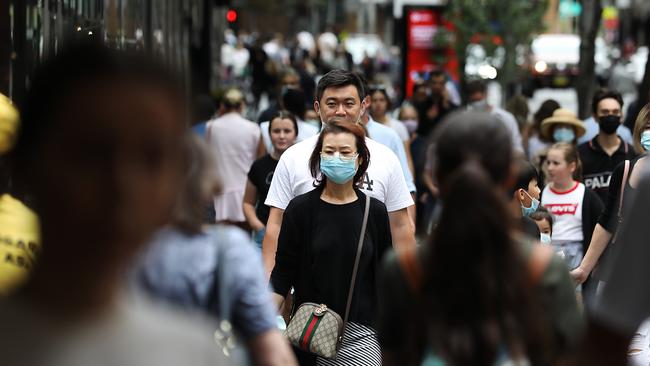Coronavirus: Suburban retail sales still strong as Sydney city tanks
Retailers were hopeful the northern beaches lockdown would not spoil their Christmas, with strong sales still on track for the festive season.

With the pace of new COVID-19 infections in NSW slowing on Monday, retailers were hopeful the northern beaches lockdown would not spoil their Christmas, with strong sales still on track for the festive season.
But the restrictions may already have cost Sydney’s hospitality business a $35m hit this week, and CBD retail businesses are still suffering due to requirements that northern beaches residents shop locally or stay at home.
Australian Retailers Association chief executive Paul Zahra said it remained too early to tell how much damage the renewed restrictions and negative headlines would have on spending.
But as Australians stocked up on fresh food and last-minute gifts, Mr Zahra said there was no evidence that the lockdown would unduly damage a traditionally intensely busy week for retailers ahead of Christmas.
“The majority of Christmas shopping has occurred but this week is a big week,” he said.
“Sales up to this point have been strong and we are sticking to our forecasts for now.”
Research from the Stripe payments group has shown that as office workers are no longer heading into the city, the pandemic has made suburbs the hotbeds of business activity.
Outer suburbs have been much less affected than metropolitan areas. Sydney’s CBD experienced a decline of 33 per cent in retail and recreational spending in October and November.
In the same period, outer suburban areas such as Campbelltown, Camden and the Blue Mountains experienced increases of 12, 15 and 13 per cent respectively across the same categories.
Toy and games seller HobbyCo has an outlet in Sydney CBD’s Queen Victoria Building, but opened stores in Rhodes and Chatswood earlier this year as a reaction to the decreased popularity of city shopping.
“We opened up stores in suburbs to adapt to the changing conditions, as well as pouring more money into our online store,” general manager Chris Anson said. “While our CBD store has seen a decline in revenue, the suburban stores have seen an increase. It doesn’t even make sense — the city is the safest place to be right now because there are no tourists.”
Citi analysts estimate that Sydney’s COVID-19 cluster and associated restrictions — and in particular the reintroduction of the one person per 4sq m rule — would have cost the city’s hospitality businesses $35m this week.
A typical household will spend $3700 in December in retail, with a Citigroup report saying Australian consumers are “well-placed to spend up this Christmas”.
The biggest hit from the latest scare would be to the tourism industry in NSW and around the country. Assuming newly reinstated border controls last for a month, Citi estimates a $2bn hit to the national tourism sector.
“NSW will likely bear the largest impact as it will likely lose the most tourism,” Citi chief economist Josh Williamson said. “Moreover, every $1 spent on tourism in NSW generates an additional 84 cents of spending,” he said — suggesting further indirect costs for associated businesses.
Consumer confidence, which had fully recovered to pre-COVID-19 levels, will be shaken by the latest outbreak. The ANZ-Roy Morgan consumer confidence gauge has climbed in each of the past 15 weeks besides one, when Adelaide was placed into lockdown for a few days.
ANZ head of Australian economics David Plank said the latest weekly consumer sentiment survey — conducted over the weekend and to be released on Tuesday — would show the Sydney outbreak had hit confidence.



To join the conversation, please log in. Don't have an account? Register
Join the conversation, you are commenting as Logout